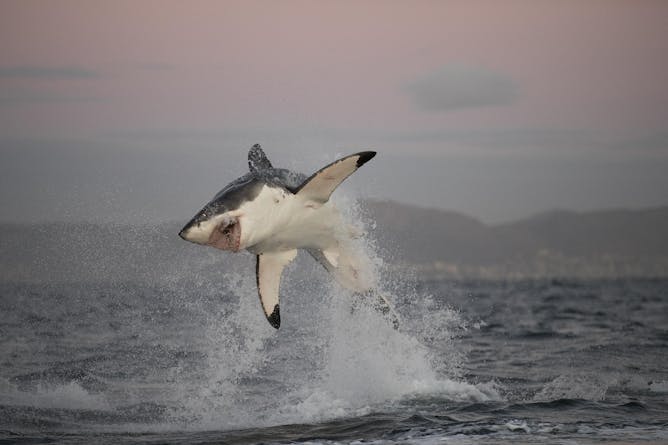|
Every day hundreds of millions of people walk in African cities, making their way to their destinations. This has prompted policymakers to develop urban and transport policies that address the needs of pedestrians. But, as a group of urban planners discovered in a study of Ghana’s capital, Accra, there’s a serious gap between policy and reality. This makes walking an unpleasant experience.
South Africa’s great white sharks could be in grave danger. A group of specialist shark researchers tagged 21 of the sharks in the southern Cape in 2019. Today, 18 of those seem to have died and the researchers are only able to locate three. Along with far fewer sightings of adult white sharks, the signs are there that the populations of these majestic creatures have gone into a sharp decline. The researchers provide insights into the possible reasons.
This week, as The Conversation Africa marks its 9th birthday, we launch our annual donations campaign. We aim to serve as a source of trusted news analysis and insights about the African continent. Please consider supporting our work by making a donation.
Donate now
|

|
Godfred Boafo
Commissioning Editor: Ghana
|
|

Seth Asare Okyere, University of Arizona; Daniel Oviedo, UCL; Louis Kusi Frimpong, University of Environment and Sustainable Development ; Matthew Abunyewah, Charles Darwin University; Stephen Leonard Mensah, University of Memphis
Walking is a common way of getting around in most African cities
|

Enrico Gennari, Rhodes University; Neil Hammerschlag, University of Oregon; Sara Andreotti, Stellenbosch University
The majestic white shark that once drew many tourists to South Africa’s Western and Southern Cape regions has all but disappeared - and the only explanation can be a sharp decline in the population.
|
Business & Economy
|
-
Carlos Lopes, University of Cape Town
African countries are being driven into a debt dependency cycle. Three major factors are at play.
-
Timothy Njagi Njeru, Egerton University
Massive damage to key infrastructure and croplands means the effects of Kenya’s devastating floods will be felt for a long time.
-
Klara Fischer, Swedish University of Agricultural Sciences
The South African government has failed to reverse the decline in smallholder farming that began during apartheid. A different approach is needed to support smallholder livelihoods.
-
Bedassa Tadesse, University of Minnesota Duluth
A review of scholarly articles shows Agoa benefits are uneven across sub-Saharan Africa.
-
Stephen Onyeiwu, Allegheny College
Increasing the minimum wage is a temporary fix. Upgrading the skills of Nigerian workers is the surest way of boosting their wages.
|
|
Art, Culture & Society
|

Nedine Moonsamy, University of Johannesburg
Tlotlo Tsamaase’s first novel adds to an exciting and growing body of African science fiction.
|
Science & Technology
|
-
Carla Jacquelyn du Toit, University of Cambridge
Africa’s hadeda ibises can sense vibrations using a special sensory organ in their beaks. But they need moist soil for it to work.
-
Charles Helm, Nelson Mandela University; Jan Carlo De Vynck, University of the Witwatersrand
There appear to be two possible explanations for circular patterns with central depressions in Pleistocene deposits on the Cape coast.
|
|
Health & Medicine
|

Priya Soma-Pillay, University of Pretoria; Andre Van Niekerk, University of Pretoria
Caesarean section births are often thought to be safer. In fact they disrupt the natural bond between mother and baby and can interrupt brain development.
|
Politics
|
-
Helga Dickow, University of Freiburg
Chad’s presidential elections on 6 May will officially mark the end of the transitional government but will not mean a break with authoritarian rule.
-
Mashupye Herbert Maserumule, Tshwane University of Technology
Opinion polls show that the uMkhonto weSizwe party enjoys significant support in KwaZulu-Natal, Jacob Zuma’s home province.
-
Frans Viljoen, University of Pretoria
While some opposition is to be expected, indications are that the general Zimbabwean public will take the government’s lead on abolition.
|
|
Environment & Energy
|

Ricardo Amansure, Stellenbosch University
South Africa’s roadmap to renewable energy has to make sure that electricity will be durable and equitable for all its residents.
|
Education
|
-
Tawanda Makusha, Human Sciences Research Council
The fear of becoming a father is not a sign of weakness. Rather, it shows you understand that it’s a big role.
-
Thandi Lewin, University of Johannesburg
The system has allowed many students who would otherwise not access higher education to do so, but it is fraught with problems.
|
|
| |
| |
| |

|
| |
| |
| |
|
|
14 May 2024
•
Johannesburg
|

|
15 May 2024
•
Johannesburg
|

|
16 May 2024
•
Stellenbosch
|

|
|
|

|
|
|
|
| |
| |
| |
Would you like to republish any of these articles?
|
|
It’s free to republish, here are the guidelines.
Contact us on africa-republish@theconversation.com in case you need assistance.
|
| |
| |
| |
| |
|
|